Discover how to install Openfire on CentOS 7 with our comprehensive guide. Follow our detailed instructions to configure Openfire Server on your CentOS 7 effortlessly. #centlinux #linux #xmpp
Table of Contents
What is Openfire?
Openfire is a cross-platform real-time collaboration server developed in Java and based on the XMPP / Jabber protocol. Openfire is formerly known as Wildfire and Jive Messenger. It is developed by Jive Software and maintained by Ignite Realtime community. Openfire is free and open-source and distributed under Apache License 2.0.
In this article, we will install Openfire on CentOS 7 and then we will use Spark client to connect with our Openfire XMPP server.
System Specification
We have provisioned a CentOS 7 virtual machine with following specification.
- Hostname – openfire-01.example.com
- IP Address – 192.168.116.170 /24
- Operating System – CentOS 7.6
We will configure the above CentOS 7 machine as Openfire server and used our Host machine (MS Windows) to install and test our Openfire server using Spark client.
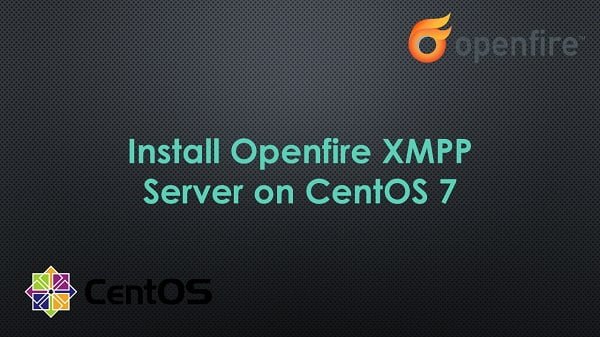
Install MariaDB on CentOS 7
We will configure Openfire to use an external database for optimum performance. For this purpose, we are installing MariaDB database server using yum command.
yum install -y mariadb-serverEnable and start MariaDB service.
systemctl enable mariadb.service
systemctl start mariadb.serviceConfigure MariaDB instance as follows.
mysql_secure_installationOutput:
NOTE: RUNNING ALL PARTS OF THIS SCRIPT IS RECOMMENDED FOR ALL MariaDB
SERVERS IN PRODUCTION USE! PLEASE READ EACH STEP CAREFULLY!
In order to log into MariaDB to secure it, we'll need the current
password for the root user. If you've just installed MariaDB, and
you haven't set the root password yet, the password will be blank,
so you should just press enter here.
Enter current password for root (enter for none):
OK, successfully used password, moving on...
Setting the root password ensures that nobody can log into the MariaDB
root user without the proper authorisation.
Set root password? [Y/n] Y
New password:
Re-enter new password:
Password updated successfully!
Reloading privilege tables..
... Success!
By default, a MariaDB installation has an anonymous user, allowing anyone
to log into MariaDB without having to have a user account created for
them. This is intended only for testing, and to make the installation
go a bit smoother. You should remove them before moving into a
production environment.
Remove anonymous users? [Y/n] Y
... Success!
Normally, root should only be allowed to connect from 'localhost'. This
ensures that someone cannot guess at the root password from the network.
Disallow root login remotely? [Y/n] Y
... Success!
By default, MariaDB comes with a database named 'test' that anyone can
access. This is also intended only for testing, and should be removed
before moving into a production environment.
Remove test database and access to it? [Y/n] Y
- Dropping test database...
... Success!
- Removing privileges on test database...
... Success!
Reloading the privilege tables will ensure that all changes made so far
will take effect immediately.
Reload privilege tables now? [Y/n] Y
... Success!
Cleaning up...
All done! If you've completed all of the above steps, your MariaDB
installation should now be secure.
Thanks for using MariaDB!
MariaDB has been installed successfully. If you want to install a latest release of MariaDB then please refer to our previous article Installing MariaDB 10.3 Server on CentOS 7.
If you’re serious about mastering databases and boosting your tech career, The Ultimate MySQL Bootcamp: Go from SQL Beginner to Expert by Colt Steele is one of the most practical and highly-rated online courses available. Designed for both beginners and professionals, this course walks you step-by-step from the fundamentals of SQL to advanced database management skills using real-world examples.
Whether you’re a developer, data analyst, or aspiring system administrator, this bootcamp will give you the confidence to work with MySQL like a pro. [Enroll today] and start building skills that employers value.
Disclaimer: This post contains affiliate links. If you purchase through these links, I may earn a small commission at no additional cost to you.
Install Openfire on CentOS 7
Connect with openfire-01.example.com using ssh as root user.
Download latest version (currently Openfire 4.3.2) from Ignite Realtime Website.
There are two variations of Openfire are available here i.e. with or without JRE. We recommend you to download and install the Openfire with JRE. Otherwise you have to explicitly install OpenJDK before installing Openfire without JRE.
cd /tmp
wget -O openfire-4.3.2-1.x86_64.rpm https://www.igniterealtime.org/downloadServlet?filename=openfire/openfire-4.3.2-1.x86_64.rpmInstall Openfire package using rpm command.
rpm -ivh openfire-4.3.2-1.x86_64.rpmOutput:
Preparing... ################################# [100%]
Updating / installing...
1:openfire-4.3.2-1 ################################# [100%]
Restarting openfire (via systemctl): [ OK ]
Openfire service is already enabled during package installation, therefore, there we are only required to start it once.
systemctl is-enabled openfire
systemctl start openfireOutput:
openfire.service is not a native service, redirecting to /sbin/chkconfig.
Executing /sbin/chkconfig openfire --level=5
enabled
Check the status of the Openfire service.
systemctl status openfireOutput:
â openfire.service - SYSV: Openfire is an XMPP server, which is a server that facilitates XML based communication, such as chat.
Loaded: loaded (/etc/rc.d/init.d/openfire; bad; vendor preset: disabled)
Active: active (running) since Sun 2019-05-26 14:24:06 PKT; 1s ago
Docs: man:systemd-sysv-generator(8)
Process: 15499 ExecStart=/etc/rc.d/init.d/openfire start (code=exited, status=0/SUCCESS)
Main PID: 15513 (java)
CGroup: /system.slice/openfire.service
⣠15513 /opt/openfire/jre/bin/java -Dlog4j.configurationFile=/opt/...
May 26 14:24:04 openfire-01.example.com systemd[1]: Starting SYSV: Openfire i...
May 26 14:24:05 openfire-01.example.com su[15511]: (to daemon) root on none
May 26 14:24:05 openfire-01.example.com openfire[15499]: Starting openfire:
May 26 14:24:06 openfire-01.example.com systemd[1]: Started SYSV: Openfire is...
Hint: Some lines were ellipsized, use -l to show in full.
Openfire Service is successfully started.
Configure Linux Firewall
Allow Openfire service ports in Linux firewall as follows.
firewall-cmd --permanent --add-port={9090,5222}/tcp
firewall-cmd --reloadCreate Openfire Backend Database
Login to mysql database server.
mysql -u root -p123Create a database for Openfire software in MariaDB server.
CREATE DATABASE openfire;
GRANT ALL ON openfire.* to 'openfire'@'localhost' IDENTIFIED BY '123';
GRANT ALL ON openfire.* to 'openfire'@'openfire-01.example.com' IDENTIFIED BY '123';
FLUSH PRIVILEGES;
EXITConnect as openfire user and create database schema in openfire database using the scripts provided within Openfire home directory.
mysql -u openfire -p123Create database schema in openfire database.
USE openfire;
SOURCE /opt/openfire/resources/database/openfire_mysql.sqlCheck list of tables in openfire database.
SHOW TABLES;
EXITOutput:
+----------------------+
| Tables_in_openfire |
+----------------------+
| ofExtComponentConf |
| ofGroup |
| ofGroupProp |
| ofGroupUser |
| ofID |
| ofMucAffiliation |
| ofMucConversationLog |
| ofMucMember |
| ofMucRoom |
| ofMucRoomProp |
| ofMucService |
| ofMucServiceProp |
| ofOffline |
| ofPresence |
| ofPrivacyList |
| ofProperty |
| ofPubsubAffiliation |
| ofPubsubDefaultConf |
| ofPubsubItem |
| ofPubsubNode |
| ofPubsubNodeGroups |
| ofPubsubNodeJIDs |
| ofPubsubSubscription |
| ofRemoteServerConf |
| ofRoster |
| ofRosterGroups |
| ofSASLAuthorized |
| ofSecurityAuditLog |
| ofUser |
| ofUserFlag |
| ofUserProp |
| ofVCard |
| ofVersion |
+----------------------+
33 rows in set (0.00 sec)
Configure Openfire server on CentOS 7
To start Openfire setup, browse URL http://openfire-01.example.com:9090/ in a client’s browser.
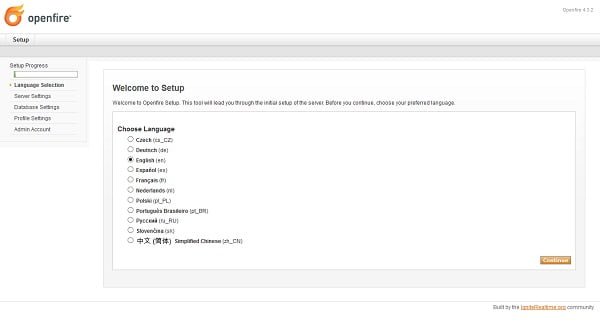
Choose your preferred language and click on Continue.
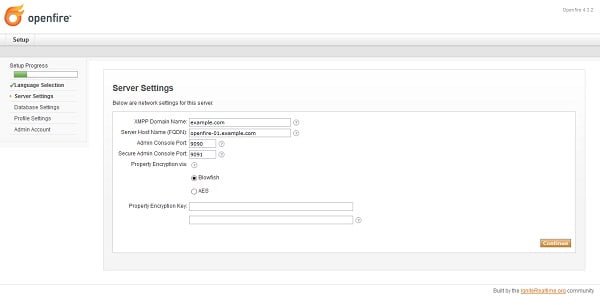
Configure Server Settings as mentioned in above screenshot and click on Continue.
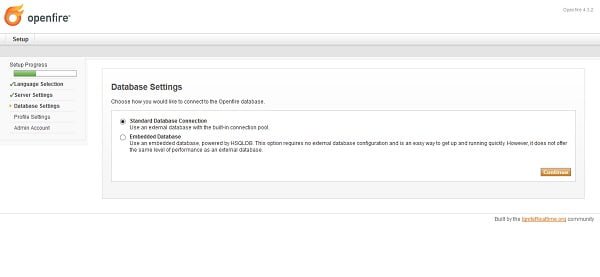
We have configured a MariaDB database for our Openfire server. Therefore, choose Standard Database Connection on Database Settings page and click on Continue.
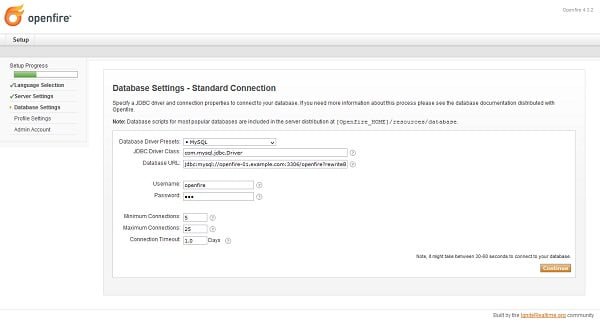
Define Database Connection settings according to above screenshot and click on Continue.
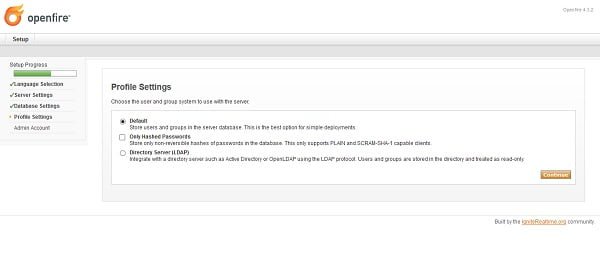
You are at the Profile Settings page. Accept the default settings and click on Continue.
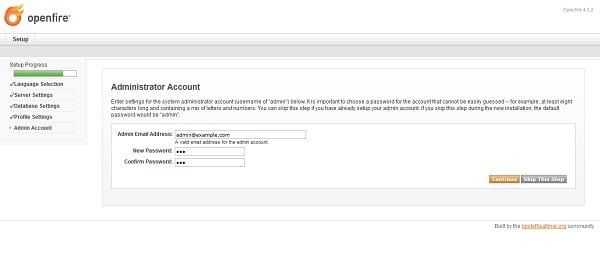
Define email address and password for Administrator Account and click on Continue.
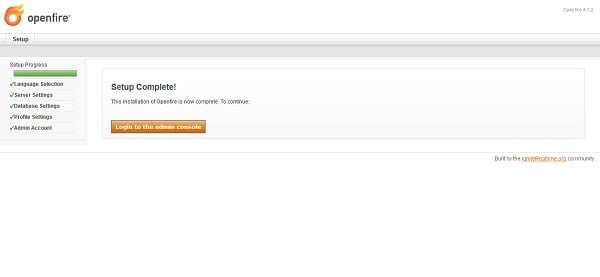
Setup is completed. Click on Login to the admin console to access Openfire web UI.
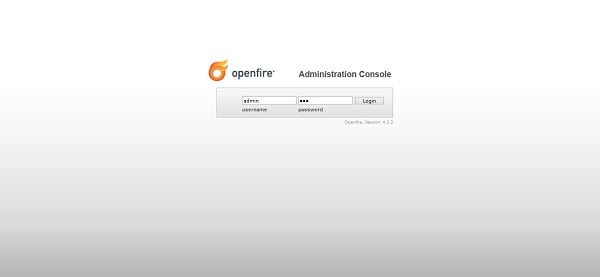
Login as admin user.
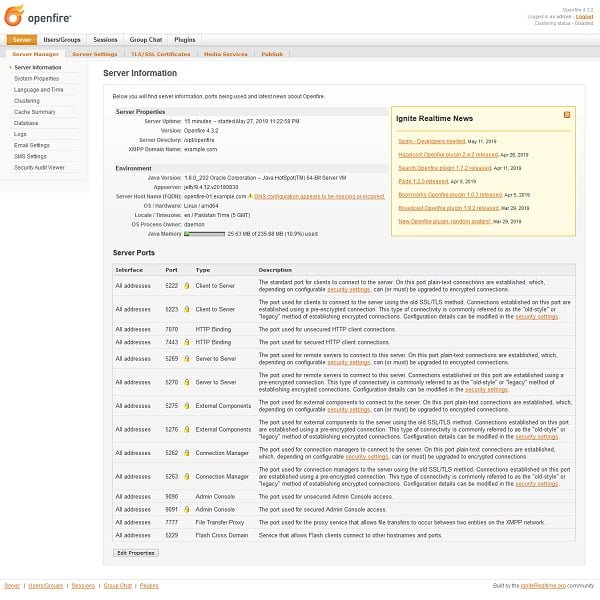
After successful login, you may reach at the System Information page of Openfire admin console.
Click on Users/Groups to create a new user for accessing Openfire services.
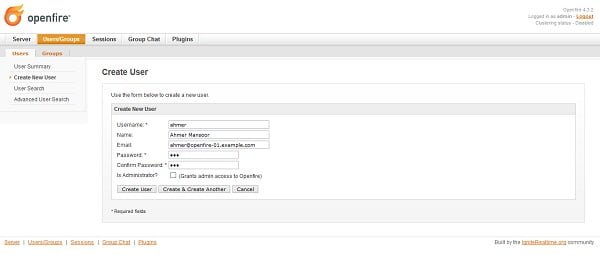
Create a regular user as we have created in above screenshot.
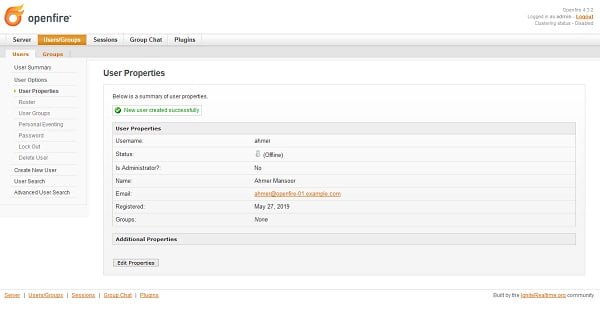
User ahmer has been created.
The user we have created is enough to demonstrate the client connectivity with Openfire server, therefore, we are not creating more users here. You can create as many users/groups as you like from the same page.
Install Spark IM Client for Windows
We have successfully install Openfire on CentOS 7. Now, we need a client system and software to test our configurations.
Ignite Realtime provides Spark software. It is a free and open-source XMPP client. We will install it on our Microsoft Windows based machine and then use it to connect with our Openfire XMPP server.
Download Spark client from Ignite Realtime website and install it on the MS Windows. We are not going to show the installation process of Spark client, because it is pretty straight forward and you should go on with the default options.
After installation, Run Spark client.

We can login using ahmer user, but we have to perform some additional settings before login.
Click on Advanced.

We have to configure two settings here:
1. Set hostname or IP address of Openfire server
2. Accept all certificates to remove certificate warning at user login.
Click on Ok.

Click on Login.

We have successfully login to our Openfire XMPP server on CentOS 7 using Spark IM client.
Final Thoughts
Installing Openfire on CentOS 7 sets up a powerful and flexible XMPP-based instant messaging server for real-time communication needs. In this guide, we covered installing the necessary dependencies, setting up the Openfire service, and completing the web-based configuration.
With Openfire now successfully installed, you have a scalable and customizable platform ready to support private messaging, group chats, and collaboration features. To keep your Openfire server secure and efficient, remember to apply updates regularly, configure proper authentication settings, and monitor server performance.
Need expert AWS and Linux system administration? From cloud architecture to server optimization, I provide reliable and efficient solutions tailored to your needs. Hire me today!

Leave a Reply
You must be logged in to post a comment.